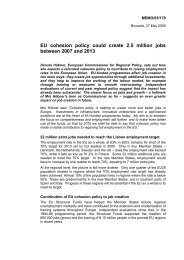Industrial Relations in Europe 2012 - European Commission - Europa
Industrial Relations in Europe 2012 - European Commission - Europa
Industrial Relations in Europe 2012 - European Commission - Europa
Create successful ePaper yourself
Turn your PDF publications into a flip-book with our unique Google optimized e-Paper software.
6.2.2 Disadvantages of social partner <strong>in</strong>volvement<br />
There is a converse argument that social partner <strong>in</strong>volvement <strong>in</strong> reform and change can result <strong>in</strong><br />
more limited change than would be the case if policymakers acted unilaterally (Marier 2008). For<br />
example, where there is formal social partner <strong>in</strong>volvement <strong>in</strong> pension reform, this can lead to a<br />
more limited reform, result<strong>in</strong>g <strong>in</strong> a situation much nearer to the status quo, as a social partneragreed<br />
structure is likely to have more built-<strong>in</strong> po<strong>in</strong>ts of veto.<br />
The nature of the relationship between the government and the social partners is also likely to have<br />
an effect on implementation of social reforms. Marier looks at whether social partner <strong>in</strong>volvement<br />
<strong>in</strong> welfare reform is more successful <strong>in</strong> the case of a cooperative relationship with the government<br />
(as <strong>in</strong> Belgium), than a conflictual relationship (as <strong>in</strong> France). He f<strong>in</strong>ds that France has actually been<br />
more successful <strong>in</strong> implement<strong>in</strong>g reforms than Belgium, even though French unions tend to be<br />
“outsiders” (oppos<strong>in</strong>g rather than participat<strong>in</strong>g <strong>in</strong> reform). One reason for this may be that Belgian<br />
pension reforms <strong>in</strong> 1996 tended to be less effective than similar French reforms, as they <strong>in</strong>cluded<br />
many social compensations, such as exemptions or payments to compensate for losses <strong>in</strong>curred as a<br />
result of the reform, and were lesser <strong>in</strong> scope to start with.<br />
<strong>Industrial</strong> relations and social policy are <strong>in</strong>tertw<strong>in</strong>ed to a considerable degree, <strong>in</strong> the context of the<br />
social partners’ cont<strong>in</strong>u<strong>in</strong>g <strong>in</strong>fluence on welfare reform <strong>in</strong> many countries, and there would seem to<br />
be scope <strong>in</strong> the future for more social partner <strong>in</strong>fluence <strong>in</strong> the reforms that will be needed <strong>in</strong> the<br />
future. For example, <strong>in</strong> the context of the restructur<strong>in</strong>g of the welfare state, there is <strong>in</strong>creased scope<br />
for the conclusion of social pacts <strong>in</strong>volv<strong>in</strong>g the social partners, and for the creation of more private<br />
occupational welfare arrangements such as private pension provision (Ebb<strong>in</strong>ghaus 2010b) – see the<br />
section below on pensions for more details.<br />
Further evidence of the <strong>in</strong>terconnection between <strong>in</strong>dustrial relations and social policy is the fact that<br />
social contributions can be seen as reduc<strong>in</strong>g net wages for workers and <strong>in</strong>creas<strong>in</strong>g non-wage labour<br />
costs for employers (Ebb<strong>in</strong>ghaus 2010b). Any changes, ie <strong>in</strong>creases, <strong>in</strong> these social contributions<br />
will therefore reduce wages and raise overall labour costs, thus mak<strong>in</strong>g it logical to class wage<br />
negotiations and social policy reforms as <strong>in</strong>terdependent activities.<br />
This section has sketched some of the key issues relat<strong>in</strong>g to the debate about social partner<br />
<strong>in</strong>volvement <strong>in</strong> social policy development more widely and unemployment benefit and pension<br />
systems <strong>in</strong> particular. Although there is a wide difference between national systems, some<br />
categorisation is possible. Common to all national systems are issues surround<strong>in</strong>g the perceived<br />
advantages and disadvantages of social partner <strong>in</strong>volvement <strong>in</strong> policy formulation, although the<br />
precise nature of this depends on issues such as the relationship between the social partners and<br />
policymakers, and the exact role that they play. The <strong>in</strong>volvement of the social partners <strong>in</strong> social<br />
policy development sits at the <strong>in</strong>teraction between <strong>in</strong>dustrial relations and social policy, as many<br />
outcomes of social policy, such as social charges, have a direct effect on net pay. This therefore<br />
b<strong>in</strong>ds the social partners more tightly <strong>in</strong>to discussions on social policy and benefit reform. In the<br />
past, there has been an exchange between wage moderation and social rights (ie lower wage<br />
<strong>in</strong>creases <strong>in</strong> exchange for improvements <strong>in</strong> social rights), but today’s <strong>in</strong>ternational economic<br />
competition and limits on state welfare spend<strong>in</strong>g no longer permit such an exchange (Ebb<strong>in</strong>ghaus<br />
2010b). A balanced view of the role of employers and unions therefore needs to be developed <strong>in</strong><br />
order to understand the ongo<strong>in</strong>g challenges fac<strong>in</strong>g employers and unions, shifts <strong>in</strong> responsibility<br />
between state and non-state actors, and the repercussions of this for <strong>in</strong>come <strong>in</strong>equality and social<br />
security.<br />
232

















